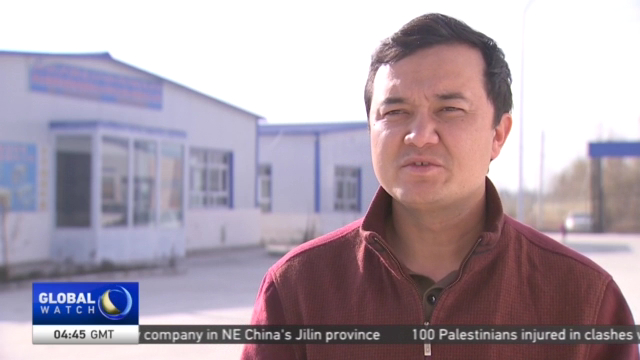
13:22, 24-Nov-2018
China Poverty Reduction: Xinjiang's Pishan County upgrades family workshops to create jobs
Updated
13:00, 27-Nov-2018
02:39

China is facing a critical period in poverty alleviation. One of the strategies in the rural areas is to provide jobs and teach skills. Xinjiang Uygur Autonomous Region has taken some measures to scale up local family workshops to provide more opportunities for farmers. CGTN's Zhao Yunfei has more.
On the edge of the Taklimakan Desert, seeds of hope are planted. In Pishan County's Tuwankumkul Village in Xinjiang, a new factory area is built to bring job opportunities. Of the 48 workers hired for this production line for the flatbread called naan, 38 come from families with incomes below the poverty line.
BUAJAR MIJIT NAAN FACTORY WORKER "In the past, only my husband had a job. Now I also have a job. Our life is getting better."
With the coordination of the local government, the factory gets an order of 10,000 breads a day big enough to keep the workers busy and well-compensated. The arable land in Tuwankumkul is limited. Factories like this are one solution to the labor surplus in the village.
ABUDURAHMAN AHMAT NAAN FACTORY MANAGER "When we hire new people, we give priority to our villagers who still need financial support. Then we consider people from other villages."
Now the village is taking a further step, to boost the productivity of the land. Nearby the naan workshop, farmers are growing their first crop of crocuses for saffron. It's hoped this spice, which is also used in Chinese medicine, will prove profitable.
ZHU JUN SAFFRON CULTIVATION RESEARCHER "In the first year, we put in a significant amount of money, but later we will gradually make a profit. Every mu of saffron is worth 20,000 yuan. It's more impressive than planting ordinary crops."
China plans to eliminate poverty by 2020. And that is not an easy task.
ABLIMIT BARAT TUWANKUMKUL VILLAGE COMMITTEE DIRECTOR "These factories haven't made any profit yet. But we are facing the critical two years. Our first task is to get the farmers out of poverty, and then slowly recover the cost."
ZHAO YUNFEI PISHAN COUNTY, XINJIANG "So far, Pishan county has upgraded six home workshops into mini-factories. Many of the workers in this factory zone used to be seasonal farmers. The new industry has provided consistent income and stability to their lives. Zhao Yunfei, CGTN, Pishan County, Xinjiang Uygur Autonomous region."

SITEMAP
Copyright © 2018 CGTN. Beijing ICP prepared NO.16065310-3
Copyright © 2018 CGTN. Beijing ICP prepared NO.16065310-3